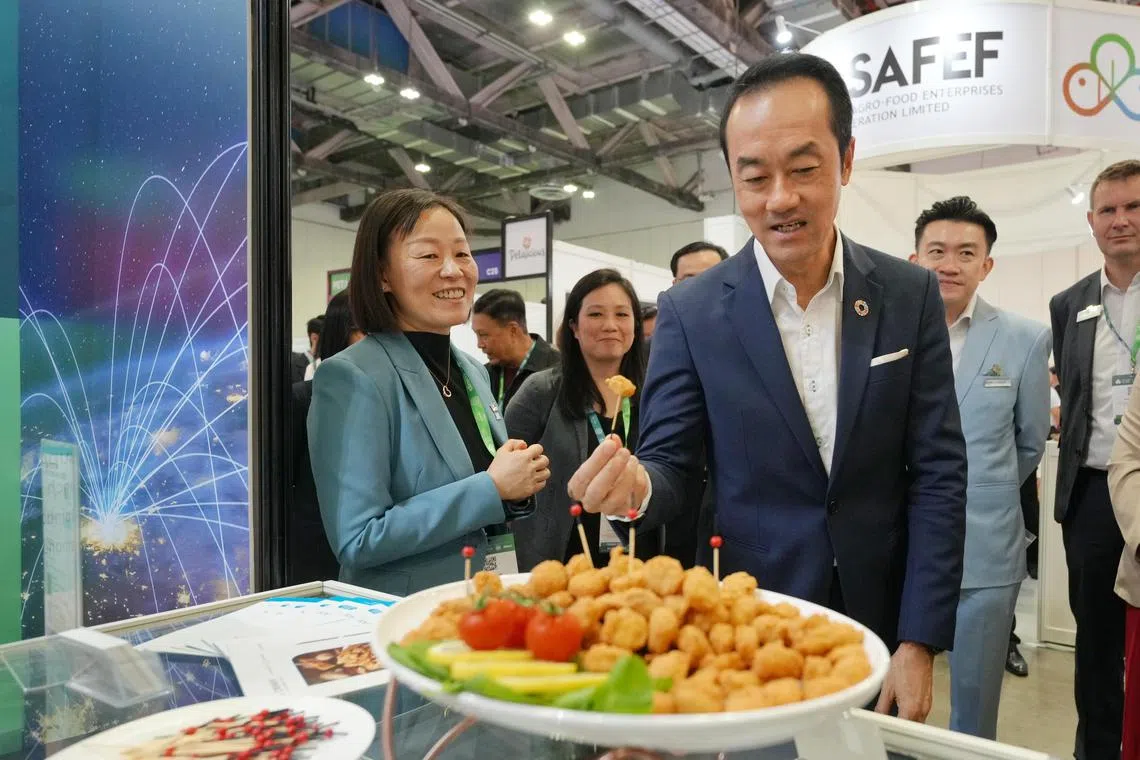S’pore calls for proposals from researchers, industry partners to develop tastier novel foods
Sign up now: Get ST's newsletters delivered to your inbox

Senior Minister of State for Sustainability and the Environment Koh Poh Koon said Singapore is particularly vulnerable to global food supply disruptions.
PHOTO: LIANHE ZAOBAO
SINGAPORE – Singapore is taking steps to develop novel foods that are tastier and more nutritious for consumers here.
The Singapore Food Agency (SFA) on Nov 21 started calling for proposals from researchers and industry partners to develop solutions to enhance the appeal of alternative proteins, such as cultivated meat or plant-based foods.
Under the grant call, initiatives that look into the taste, aroma and texture of these products, or efforts that aim to ensure their nutritional value is similar to or better than conventional proteins, could be eligible for funding support.
The goal, said Senior Minister of State for Sustainability and the Environment Koh Poh Koon, is to make such products more acceptable to consumers.
He was speaking on Nov 21 during the Global Agri-Food Scientific Symposium at the Singapore International Agri-Food Week.
Alternative proteins refer to insect proteins, meat made from plants or cultivated from animal cells, or proteins produced via fermentation. They are considered more sustainable as they do not involve animal slaughter, and require less resources, such as land and water, to produce.
Singapore had in July approved 16 species of insects for consumption here.
Speaking during the event held at the Sands Expo and Convention Centre, Dr Koh said that Singapore is particularly vulnerable to global food supply disruptions as it imports more than 90 per cent of its food.

Senior Minister of State for Sustainability and the Environment Koh Poh Koon said the goal of the latest grant call is to make novel foods more acceptable to consumers.
PHOTO: LIANHE ZAOBAO
“Embracing science and technology advancements will also help us grow local agri-food capabilities and create more resilient and sustainable food systems for the future,” he said.
The latest grant call, part of the broader $309 million Singapore Food Story research programme that focuses on tackling food security and safety issues, is the second one by SFA for “future foods”, or novel foods.
Principal investigators from all Singapore-based institutes of higher learning (IHLs), as well as from public sector agencies or private sector organisations, are eligible to submit applications.
Funding support for each research proposal awarded under the second grant call will be up to $7 million for a period of up to four years.
Singapore-based IHLs and public sector agencies are eligible to get up to 100 per cent of the approved costs directly related to the project, while private sector entities seeking research funding must collaborate with local research organisations that are publicly funded.
Dr Koh said the first future foods grant call was launched in 2023 to improve the productivity of local food producers beyond what the best of current technologies can do, and to facilitate the future manufacturing of alternative proteins.
This first grant call was open from November 2023 to January 2024.
One of the four teams that were awarded the first future foods grant was the Grow Meats project team, comprising researchers doing research on cultivated meat from A*Star, NUS and the Singapore Institute of Technology.
Cultivated meat refers to meat products that are made from growing animal cells in a bioreactor – similar to the vats used in brewing beer – instead of slaughtering actual animals. This is considered to be a more sustainable meat production method, as large volumes can be produced involving less land and labour.
To make cultured meat products more affordable for consumers, the Grow Meats team aims to develop a more cost-effective cell media solution and manufacturing processes that are scalable and cost-efficient.
A cell media solution is a nutrient-rich liquid that provides an optimal environment for cells to grow and function.
The second grant call comes on the back of reports of the headwinds faced by the cultivated meat sector.
In the first half of 2024, there was a delay in the opening of the Bedok facility of California-founded Eat Just, merger of cell-based seafood producer Shiok Meats and Singapore-based Umami Bioworks was reported.

A product from local firm Shiok Meats, which has faced issues scaling up its crustacean stem cells for production and delayed its market entry repeatedly since 2020.
PHOTO: LIANHE ZAOBAO
However, the future foods industry has potential for growth and development, said SFA. To facilitate low-cost, large-scale production of future foods, innovative and potentially disruptive solutions must be developed to improve the foods’ palatability and increase consumer acceptance, it said on Nov 21.
Professor William Chen, director of NTU’s food science and technology programme, told The Straits Times that the second grant call is timely and addresses the critical issues for sustainability of novel foods.
“The current headwinds faced by companies in the novel food space are a result of many factors, including cost, taste and nutrition values,” said Prof Chen.
“Novel foods with a high nutrition profile that are equally tasty as conventional foods, if not more, would certainly help the novel foods establish themselves as a viable option for consumers.”
He suggested that local innovators and producers explore turning novel foods into tasty and nutritious local dishes, such as dim sum, instead of burgers and nuggets. Additionally, he recommended using other raw materials with natural taste and a higher nutrition profile, such as mushrooms and mycelium, instead of soya beans.
Ms Mirte Gosker, managing director of Singapore-based alternative protein think-tank The Good Food Institute Asia Pacific, said that achieving price, taste and nutrition parity between alternative proteins and conventional meat is a non-negotiable factor for market success, and strategic public investments are central to hitting that goal.
Dr Andrew Powell, chief executive and co-founder of consulting agency Asia BioBusiness, said the taste of most existing products in the future food space has not really won over consumers, and it is crucial that research targets this area.
“Research to enhance the nutritional profile of these foods is also vital, as more and more consumers are including this (factor) in their decisions on what foods to buy. It must be ensured that the research supported has the consumer in focus,” he added.


